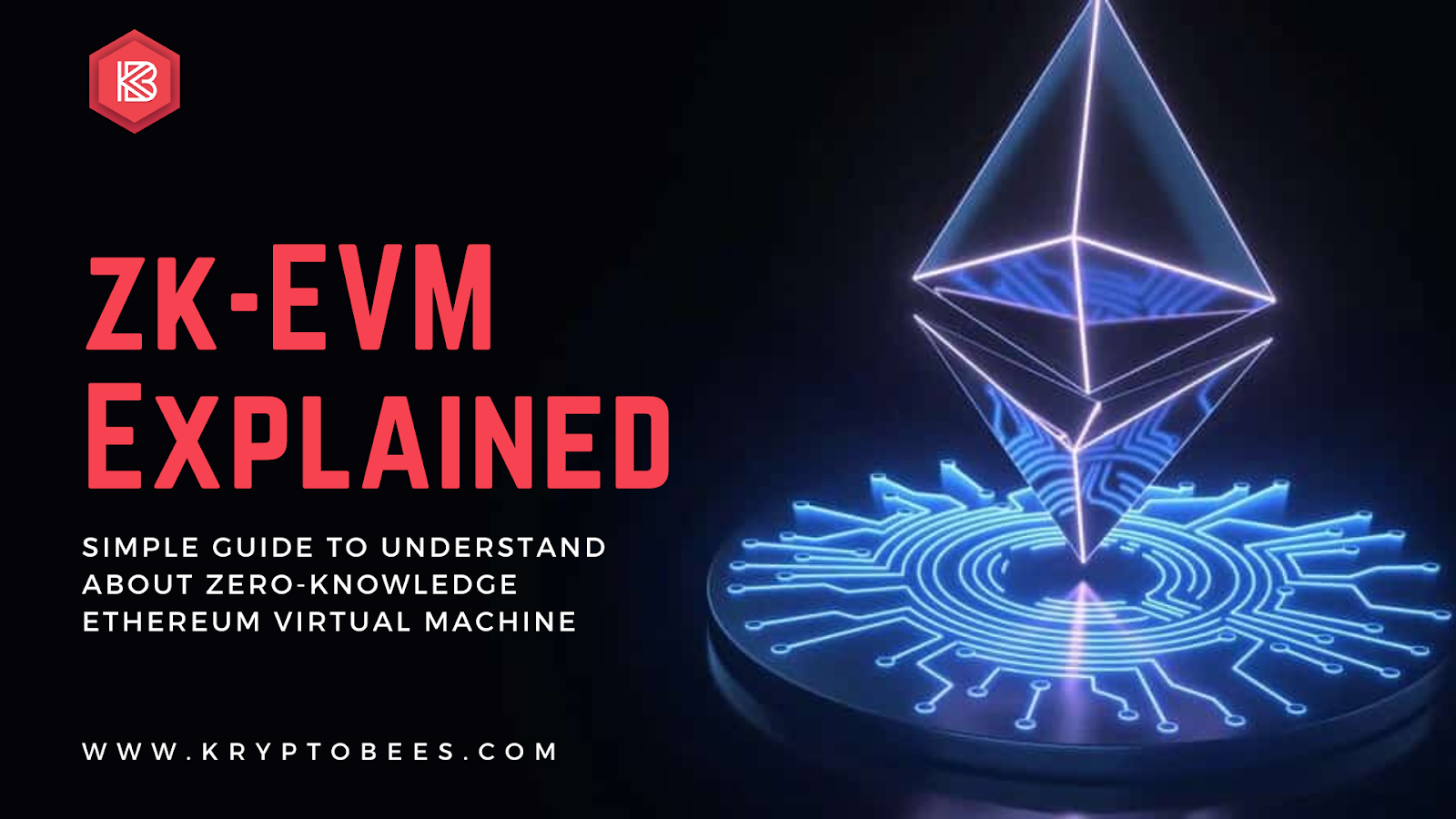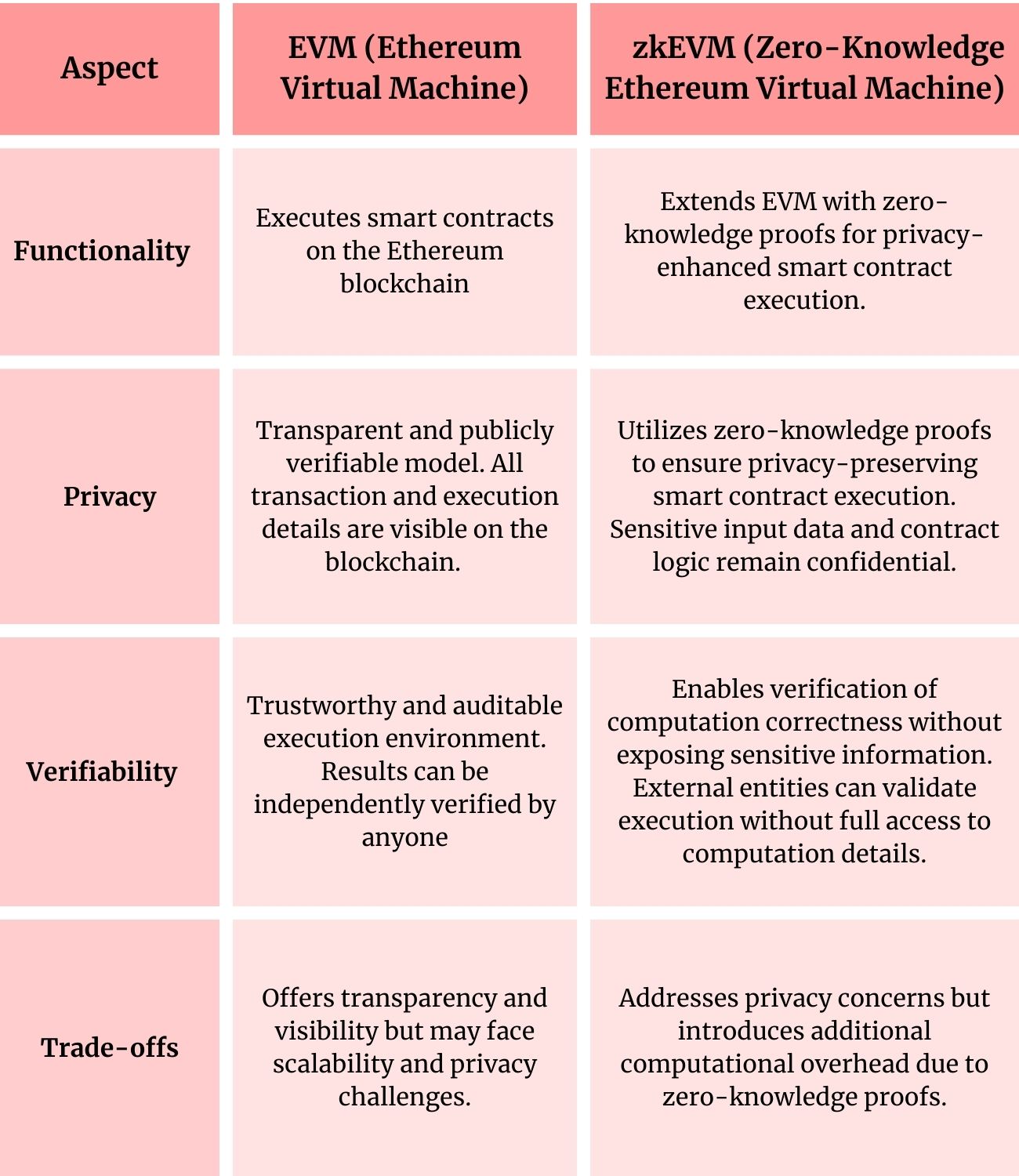zkEVM Explained : Guide to Understand Zero-Knowledge Ethereum Virtual Machine

Join us for an entrancing journey into the thrilling realm of blockchain, where currently, all the chatter is about the latest addition – the zkEVM Proof! This groundbreaking concept is shaking things up since it integrates zero-knowledge proofs to certify the accuracy and privacy of Ethereum Virtual Machine (EVM) code. If jargon like this leaves you baffled, fret not! We’re here to unravel this complicated knot in this exhaustive guide. Strap yourself in as we delve deep into the captivating sphere of ZKevm!
Here, we will shed light on the fundamental aspects of zkEVM, its importance, and its workings.
What is Actually zkEVM ?
zkEVM, or Zero-Knowledge Ethereum Virtual Machine, is a technology development in the blockchain industry that aims to improve scalability, data privacy, and security for decentralized applications built on the Ethereum platform. It leverages the power of zero-knowledge proofs, a cryptographic method where one party can prove to another party that a given statement is true, without conveying any additional information. This means that users of the zkEVM can conduct transactions or execute smart contracts without revealing any unnecessary personal information. Thus, they enjoy enhanced security and privacy while maintaining the integrity and decentralization of the Ethereum network. zkEVM is also a layer 2 scaling solution, which means it works to improve the efficiency and capacity of transactions on the Ethereum platform, effectively helping it to streamline operations and decrease costs.
Types of zk-EVM Rollups
Type 1 zkEVM (Fully Ethereum-equivalent): This zkEVM variation focuses on preserving the existing Ethereum system without making significant changes. Its primary goal is to validate transactions, blocks, and data in accordance with the existing Ethereum verification method. As a result, execution clients can generate and process rollup blocks without requiring significant changes.
Nonetheless, current proof creation durations for Ethereum blocks can be lengthy, typically taking several hours to complete.
Type 2 (totally EVM-equivalent): Type 2 zkEVMs are the same as to Ethereum but include differences to data structures and the state tree. Their key goal is to keep existing apps compatible while improving development ease and speeding up proof generation. However, more advancements in prover time are required.
One technique for dealing with certain worst-case circumstances in proof generation is to raise petrol costs for specified processes. This variant, known as Type 2.5 zkEVM, seeks to strike a balance between faster proof production and compatibility with the developer toolkit. It is crucial to remember that such gas cost modifications may have repercussions for certain applications and tool compatibility.
Type 2.5 (EVM-equivalent, except for gas costs) : Type 2.5 zkEVMs modify the Ethereum Virtual Machine (EVM) to improve proof generation time by adjusting gas costs. They maintain EVM compatibility while enhancing efficiency. Careful consideration is needed to avoid breaking applications or deviating significantly from expected EVM behavior. These variations strike a balance between optimizing performance and preserving compatibility.
Type 3 (almost EVM-equivalent) : Type 3 zkEVMs prioritize faster proof generation by sacrificing certain features of the EVM, such as precompiled smart contracts and specific handling of code and memory. While most applications will still work, some may require rewriting if they rely heavily on the removed functionalities. These variations strike a balance between speed and functionality, but adjustments may be needed for affected applications.
Type 4 (high-level-language equivalent) : This type of zkEVM involves compiling smart contract code written in a high-level language (like Solidity) into a language compatible with ZK-SNARKs. While this approach significantly reduces the costs of building a zkEVM, it renders many existing tools incompatible. For example, debugging EVM bytecode becomes challenging. Additionally, contracts may not retain the same addresses since bytecode can change during the transpilation process from one language to another.
What is the Difference Between EVM and zkEVM ?
EVM (Ethereum Virtual Machine) and zkEVM (Zero-Knowledge Ethereum Virtual Machine) are both related to the Ethereum ecosystem but serve different purposes. Here are some of the potential differences between them:

The value of zkEVM Proof in the blockchain ecosystem
At its core, the essence of zkEVM Proof’s value in the blockchain realm lies in its capability to enhance privacy, security, and scalability of smart contracts executed on the Ethereum blockchain. These benefits collectively underscore the significance of zkEVM Proof in fortifying the overall effectiveness and trustworthiness of blockchain operations and transactions. The significance is further amplified in contexts such as financial transactions or supply chain management where the principles of confidentiality and integrity are critical. Therefore, within the blockchain environment, zkEVM Proof emerges as an invaluable tool that addresses many of the privacy and performance concerns inherent in several blockchain applications today.
How Does zkEVM Works?
zkEVM proof has emerged as a game-changer by utilizing zero-knowledge proofs to validate the accuracy of EVM (Ethereum Virtual Machine) code. This revolutionary cryptographic technique enables one party to prove the truth of a statement to another party without revealing any additional information beyond the statement’s validity itself.
The zkEVM proof protocol operates through three crucial stages:
Compilation: The EVM code undergoes compilation, transforming it into a series of constraints that can be comprehended by the zero-knowledge proof system.
Proof Generation: The prover generates a zero-knowledge proof that verifies the EVM code’s adherence to the specified constraints, all while safeguarding the code and any sensitive data from exposure.
Verification: The verifier, without any knowledge of the EVM code or sensitive data, scrutinizes the proof’s validity to ensure the accuracy and privacy of the EVM code.
By ensuring correctness and privacy, zkEVM proof becomes an optimal solution for financial transactions and governance systems, empowering secure and confidential operations.
Conclusion :
Finally, the introduction of zkEVM (Zero-Knowledge Ethereum Virtual Machine) is a big step forward in the Ethereum ecosystem. The purpose of this tutorial was to shed light on the concept of zkEVM and provide a thorough grasp of its essential features and benefits.
zkEVM improves privacy, secrecy, and verifiability in smart contract execution by incorporating zero-knowledge proofs into the Ethereum Virtual Machine. It conceals sensitive input data and contract logic while yet offering a way for proving computation correctness.
Developers and enterprises can use zkEVM to open up a new world of possibilities for safe and private smart contract applications. They can address privacy problems, boost scalability, and build trust in the execution of decentralised applications by harnessing the power of zero-knowledge proofs.
Kryptobees is at the forefront of zkEVM development services, enabling our clients to realise the full potential of this game-changing technology. Our team of professionals is ready to help you integrate zkEVM into your Ethereum-based applications while ensuring privacy, security, and seamless integration.
As zkEVM evolves, it has the potential to revolutionise the Ethereum ecosystem by fuelling innovation and opening doors to new use cases. Embrace the power of zkEVM and revolutionise your Ethereum-based apps with Kryptobees as your trusted partner to stay ahead of the curve.
 Discuss Project!
Discuss Project!
